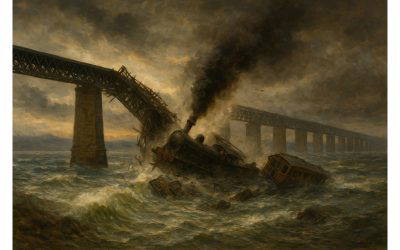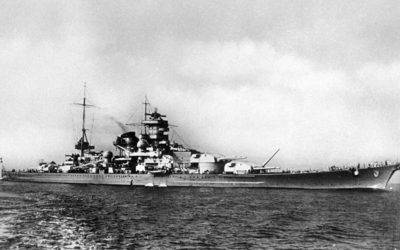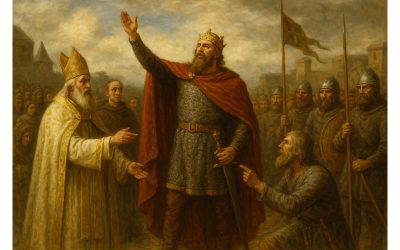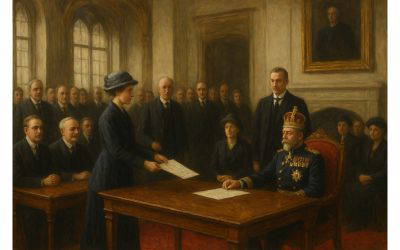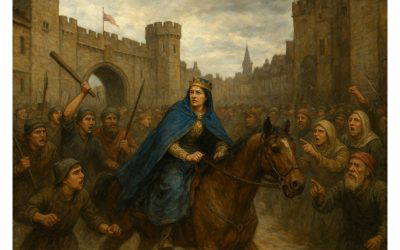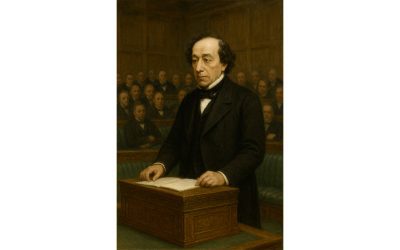Václav Havel
On the 29th of December, 1170, Thomas Becket was murdered in Cantabury Cathedral, but I’ve already posted about that. On the same day in 1989 the Czech writer, philosopher and dissident, Václav Havel, was elected the first post-communist President of Czechoslovakia....
Tay Bridge Disaster
The Tay Bridge disaster, one of the most infamous engineering tragedies in British history, occurred on the evening of the 28th of December 1879. It involved the catastrophic collapse of a section of the original Tay Railway Bridge during a violent winter storm,...
Benazir Bhutto
Benazir Bhutto was assassinated on the 27th of December 2007. I am a life member of the Oxford Union which I joined shortly after matriculating in September 1979. Sadly I was just a few years late for Richard Nixon’s speech to the Oxford Union where he admitted to...
Scharnhorst
I have written about my father’s war as a Desert Rat. I was commissioned in the Royal Naval Reserve and have an interest in ships and the sea. I have also written about the sinking of the Bismark, but today I shall write about the Scharnhorst. The German warship...
Sweyn Forkbeard
Happy Christmas dear readers. I have previously written about the origin of the 25th of December as the date on which we celebrate the birth of Jesus of Nazareth. So I have chosen to write about Sweyn Forkbeard today. He was King of Denmark from 986 CE, and according...
Benghazi
On the 24th of December, 1941, Benghazi was captured by the British Eighth Army. My father served in the 1st Battalion Rifle Brigade, 7th Armoured Division, Eighth Army. So let’s look into the history of Benghazi. Benghazi, the second largest city in Libya, has a long...
Sex Disqualification (Removal) Act 1919
The Sex Disqualification (Removal) Act 1919 received royal assent on the 23rd of December, 1919. The Sex Disqualification (Removal) Act 1919 was landmark legislation in the United Kingdom that marked a profound shift in the legal recognition of women’s rights and...
The English Anarchy
The English Anarchy, which lasted from 1135 to 1153, was a turbulent period of civil war, political instability, and social upheaval in medieval England. It began with the death of King Henry I and ended with the Treaty of Wallingford, which paved the way for the...
Benjamin Disraeli
I have made my selection for today’s post from the birthday section. Benjamin Disraeli (1804–1881) was one of the most influential figures in 19th-century British politics, celebrated both for his literary talents and his role as a two-time Prime Minister. He remains...
Václav Havel
On the 29th of December, 1170, Thomas Becket was murdered in Cantabury Cathedral, but I’ve already posted about that. On the same day in 1989 the Czech writer, philosopher and dissident, Václav Havel, was elected the first post-communist President of Czechoslovakia....
Tay Bridge Disaster
The Tay Bridge disaster, one of the most infamous engineering tragedies in British history, occurred on the evening of the 28th of December 1879. It involved the catastrophic collapse of a section of the original Tay Railway Bridge during a violent winter storm,...
Benazir Bhutto
Benazir Bhutto was assassinated on the 27th of December 2007. I am a life member of the Oxford Union which I joined shortly after matriculating in September 1979. Sadly I was just a few years late for Richard Nixon’s speech to the Oxford Union where he admitted to...
Scharnhorst
I have written about my father’s war as a Desert Rat. I was commissioned in the Royal Naval Reserve and have an interest in ships and the sea. I have also written about the sinking of the Bismark, but today I shall write about the Scharnhorst. The German warship...
Sweyn Forkbeard
Happy Christmas dear readers. I have previously written about the origin of the 25th of December as the date on which we celebrate the birth of Jesus of Nazareth. So I have chosen to write about Sweyn Forkbeard today. He was King of Denmark from 986 CE, and according...
Benghazi
On the 24th of December, 1941, Benghazi was captured by the British Eighth Army. My father served in the 1st Battalion Rifle Brigade, 7th Armoured Division, Eighth Army. So let’s look into the history of Benghazi. Benghazi, the second largest city in Libya, has a long...
Sex Disqualification (Removal) Act 1919
The Sex Disqualification (Removal) Act 1919 received royal assent on the 23rd of December, 1919. The Sex Disqualification (Removal) Act 1919 was landmark legislation in the United Kingdom that marked a profound shift in the legal recognition of women’s rights and...
The English Anarchy
The English Anarchy, which lasted from 1135 to 1153, was a turbulent period of civil war, political instability, and social upheaval in medieval England. It began with the death of King Henry I and ended with the Treaty of Wallingford, which paved the way for the...
Benjamin Disraeli
I have made my selection for today’s post from the birthday section. Benjamin Disraeli (1804–1881) was one of the most influential figures in 19th-century British politics, celebrated both for his literary talents and his role as a two-time Prime Minister. He remains...


